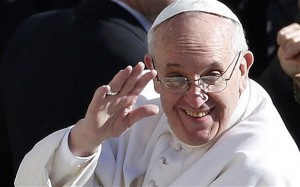John 1:29–34
29 The next day he saw Jesus coming toward him, and said, “Behold, the Lamb of God, who takes away the sin of the world! 30 This is he of whom I said, ‘After me comes a man who ranks before me, because he was before me.’ 31 I myself did not know him, but for this purpose I came baptizing with water, that he might be revealed to Israel.” 32 And John bore witness: “I saw the Spirit descend from heaven like a dove, and it remained on him.33 I myself did not know him, but he who sent me to baptize with water said to me, ‘He on whom you see the Spirit descend and remain, this is he who baptizes with the Holy Spirit.’ 34 And I have seen and have borne witness that this is the Son of God.”
John 1:29–34 ESV – Bible Gateway
As Catholics, we are very familiar with the term the “Lamb of God” as we hear it at least every time we celebrate the liturgy. We also see this in artistic imagery, but what we become so familiar with can also lose touch with.
The Navarre commentary of the Gospel of John points out:
For the first time in the Gospel Christ is called the “Lamb of God”. Isaiah had compared the sufferings of the Servant of Yahweh, the Messiah, with the sacrifice of a lamb (cf. Is 53:7); and the blood of the paschal lamb smeared on the doors of houses had served to protect the firstborn of the Israelites in Egypt (cf. Ex 12:6–7): all this was a promise and prefiguring of the true Lamb, Christ, the victim in the sacrifice of Calvary on behalf of all mankind. This is why St Paul will say that “Christ, our paschal lamb, has been sacrificed” (1 Cor 5:7). The expression “Lamb of God” also suggests the spotless innocence of the Redeemer (cf. 1 Pet 1:18–20; 1 Jn 3:5).[1]
When John the Baptist invoked this term he was not envisioning a warm image of a soft cuddly lamb, but a lamb destined for sacrifice to save us from our myriad sins.
Dr. Brant Pitre goes into the point that we “we don’t have any text that talks about the Passover Lamb taking away sin. It protects from death…” and that “the image of taking away the sin of the world is actually an allusion to the suffering servant. So in the book of Isaiah 53, Isaiah describes this mysterious figure of the servant who will take upon himself the iniquities of all the people, and Isaiah says of the servant that “like a lamb he was led to the slaughter” and that “upon him were the sins of the many,” that “he bore the sins of the many,” an image of taking away the sin of the people.”[2]
St. Theophylact of Nicomedia. (in loc.) Why does he say the sin of the world, not sins? Because he wished to express sin universally: just as we say commonly, that man was cast out of paradise; meaning the whole human race.[3]
The Catechism concurs in this:
§608 After agreeing to baptize him along with the sinners, John the Baptist looked at Jesus and pointed him out as the “Lamb of God, who takes away the sin of the world.” By doing so, he reveals that Jesus is at the same time the suffering Servant who silently allows himself to be led to the slaughter and who bears the sin of the multitudes, and also the Paschal Lamb, the symbol of Israel’s redemption at the first Passover. Christ’s whole life expresses his mission: “to serve and to give his life as a ransom for many.”[4]
There is so much depth in all that John the Baptist is revealing here. Pointing out that Jesus is the mysterious figure of the suffering servant as prophesied by Isaiah and then blithely mentioning that Jesus pre-existed him alluding to his divinity. John’s original audience would have understood none of this, would not even have even known that Jesus was born three months after him.
They also would not have been puzzled by the statement made by John that “I myself did not know him.” We, as a modern audience, might ponder why John would not know his relative Jesus.
St. Chrysostom. (Hom. xvii. ❲al. xvi.❳ 2.) That He might not seem however to give His testimony from any motive of friendship or kindred, in consequence of his being related to our Lord according to the flesh, he says, I knew Him not. John could not of course know Him, having lived in the desert. And the miraculous events of Christ’s childhood, the journey of the Magi, and such like, were now a long time past; John having been quite an infant, when they happened. And throughout the whole of the interval, He had been absolutely unknown: insomuch that John proceeds, But that He should be made manifest to Israel, therefore am I come baptizing with water. (And hence it is clear that the miracles said to have been performed by Christ in His childhood, are false and fictitious. For if Jesus had performed miracles at this early age, he would not have been unknown to John, nor would the multitude have wanted a teacher to point Him out.) Christ Himself then did not want baptism; nor was that washing for any other reason, than to give a sign beforehand of faith in Christ. For John saith not, in order to change men, and deliver from sin, but, that he should be made manifest in Israel, have I come baptizing. But would it not have been lawful for him to preach, and bring crowds together, without baptizing? Yes: but this was the easier way, for he would not have collected such numbers, had he preached without baptizing.[5]
The humility of St. John the Baptist is always so striking. Taking every effort to point to Jesus and away from himself. Aware that even the baptism of repentance he preached and practiced was to be quickly superseded.
Dr. Peter Kreeft writes:
John was not the Lamb of God who takes away the sins of the world. John cannot take away our sins. John’s baptism does not take away our sins, as Baptism in the name of Jesus does. In the Acts of the Apostles, St. Paul discovers a congregation of Christians who don’t see that great difference. He senses something missing, and he says, “How were you baptized?” And they say, “With the baptism of John.” And Paul says, “John baptized with a baptism of repentance, telling the people to believe in the one who was to come after him, that is, in Jesus.” When they heard that, “they were baptized in the name of the Lord Jesus,” and “the holy Spirit came upon them,” just as the three thousand at Pentecost. They even received the charismatic gift of speaking in tongues (Acts 19:3–8).[6]
St. John the Baptist then gives the testimony of what he witnessed after he baptized Jesus.
Dr. John Bergsma shows some of the connection that this reveals.
“I saw the Spirit come down … and remained upon him.” This calls to mind the anointing of David in 1 Samuel 16, on whom the Spirit came mightily “from that day forward” (v. 13); in other words, it remained on him. The Spirit coming down and remaining on Jesus marks him out as the heir of David. John the Baptist, the prophet, plays the role of Samuel, who anointed the first David. This Gospel announces Jesus as the fulfillment of Isaiah’s vision of the Davidic royal servant, the one who is “Israel.” Just as Israel washed in the waters of the Jordan symbolically when they crossed into the Promised Land under the first Joshua (Y’shua, Jesus), so this second Joshua (Y’shua, Jesus) comes to enter the Jordan once more and lead us all to the promised land of heaven. This is done primarily through Baptism, in which we, as Christians, are given the gift of the Holy Spirit, which gives us power to become children of God and to live lives of holiness, not continual defeat.[7]
From “The Ignatius Catholic Study Bible: New Testament” edition:
1:32 the Spirit descend as a dove: The Baptism of Jesus, which initiates his manifestation to Israel (1:31) and prefigures the effects of sacramental Baptism (3:1–13)…. remain: The Greek expression is used often in John (also translated “dwell” or “abide”) for the enduring bond between the Father and Son (14:10; 15:10) and for the indwelling of the Trinity in the believer (6:56; 14:17; 15:4–7).[8]
This is a salutary reminder for us to reflect on our own baptism and how, through it, it configures us to Christ.
Recently Pope Francis said we should celebrate our baptism like a birthday.
“It is like a birthday because baptism makes us reborn in Christian life. That is why I advise you to teach your children the date of their baptism as a new birthday: that every year they will remember and thank God for this grace of becoming a Christian.“[9]
Concluding with a paragraph from the Catechism:
§537 Through Baptism the Christian is sacramentally assimilated to Jesus, who in his own baptism anticipates his death and resurrection. The Christian must enter into this mystery of humble self-abasement and repentance, go down into the water with Jesus in order to rise with him, be reborn of water and the Spirit so as to become the Father’s beloved son in the Son and “walk in newness of life”: (CCC 1262; CCC 628)
Let us be buried with Christ by Baptism to rise with him; let us go down with him to be raised with him; and let us rise with him to be glorified with him.
Everything that happened to Christ lets us know that, after the bath of water, the Holy Spirit swoops down upon us from high heaven and that, adopted by the Father’s voice, we become sons of God.[10]
Sources
- The Navarre Bible – St. John
- Catholic Productions, Commentaries by Brant Pitre
- Catena Aurea: Commentary on the Four Gospels, Collected out of the Works of the Fathers, Volume 4: St. John – Verbum
- Catechism of the Catholic Church, 2nd Edition
- Peter Kreeft, Food for the Soul: Reflections on the Mass Readings Cycle A
- The Word of the Lord: Reflections on the Sunday Mass Readings for Year A – John Bergsma
- The Ignatius Catholic Study Bible꞉ The New Testament
- Pope Francis Celebrate the date of your baptism like a birthday Catholic News Agency
- Photo by Ben White on Unsplash
- Navarre, Saint John (2005) ↩
- Catholic Productions, Brant Pitre, 2nd Sunday in Ordinary Time (Year A) ↩
- Catholic Church. (2000). Catechism of the Catholic Church (2nd Ed). United States Catholic Conference. ↩
- Theophylact, Archbishop of Ohrid, A.D. 1078, Catena Aurea: Commentary on the Four Gospels, Collected out of the Works of the Fathers: St. John (J. H. Newman, Ed.; Vol. 4, p. 58) ↩
- Peter Kreeft, Food for the Soul: Reflections on the Mass Readings Cycle A ↩
- The Word of the Lord: Reflections on the Sunday Mass Readings for Year A, John ↩
- Ignatius Catholic Study Bible: New Testament ↩
- Pope Francis: Celebrate the date of your baptism like a birthday, https://www.catholicnewsagency.com/news/253288/pope-francis-celebrate-the-date-of-your-baptism-like-a-birthday ↩
- Catholic Church. (2000). Catechism of the Catholic Church (2nd Ed). United States Catholic Conference. Paragraph 537 ↩
- St. John Chrysostom, Abp. of Constantinople, A.D.398. Catena Aurea: Commentary on the Four Gospels, Collected out of the Works of the Fathers: St. John (J. H. Newman, Ed.; Vol. 4, p. 59) ↩



